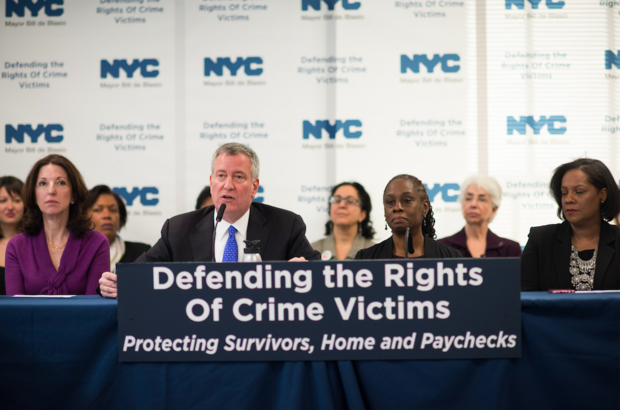
CIVIC CENTER — Domestic violence victims will get paid time off from their jobs and city- funded lawyers to help them keep their homes under new initiatives unveiled Wednesday by Mayor Bill de Blasio and his wife Chirlane McCray.
On Thursday, the City Council is expected to introduce an amendment to the Paid Sick Leave law that will specify domestic violence as a reason employees can access their guaranteed 40 hours of paid sick leave to care for themselves or a family member.
Starting next month, the city will spend $500,000 to pay for lawyers to help domestic victims stay in their homes, including help getting an abuser's name off of a lease, restricting an abuser's access to an address and even ending a lease early if a victim wants to move.
"We are with you. We will stand by you. Come forward and we will help you," de Blasio told domestic violence victims as he announced the changes.
The NYPD will also be more aggressive in preventing domestic violence by tracking chronic abusers and using the city's new community policing effort to gather intelligence on potentially abusive conditions, the mayor said.
Officers will move quickly to arrest abusers who violate orders of protection even if there is no complaint from the victim.
"We still have an unacceptably high level of domestic violence," said Susan Herman, NYPD Deputy Commissioner for Collaborative Policing.
"Any domestic violence homicide is too much. We know who the offender is. We know who the victim is. We need to do all we can to stop the violence when we are aware of both of these people."
The NYPD gets 800 domestic violence calls per day. Last year, police received one every two minutes, the mayor said. The city has had mixed results on domestic violence as overall crime continues to decline.
For fiscal year 2016, murder related to domestic violence decreased 13 percent from 61 murders to 53. But domestic violence complaints are up 2 percent to 62,581 compared to this same time last year, according to the NYPD.
Reports of rape related to domestic violence was up 9 percent in fiscal year 2016 to 526 from 481. Felony assaults related to domestic violence rose 3 percent to 7,986.
The busiest precinct for domestic violence complaints is the 75th Precinct in Bedford-Stuyvesant, which already has the community policing effort in place.
"It is time for us to come together as a city and hold those who abuse others accountable for their behavior," McCray said.
"It is time for us as a city to change the culture of allowing abusers to push their partners and their children out of their homes. It is time for us as a city to protect the rights of victims, to create a city that is safe for everyone — women, children and men."
Queens Councilwoman Julissa Ferreras-Copeland, who will introduce the amendment to the paid sick leave law, said the clarification was important because employers could possibly deny the leave the way the current law is written.
Under the law, domestic violence victims will have three consecutive days off without having to explain the details of their leave to their employer. After three consecutive days, an employer can ask the reason for the leave and request proof showing why it's needed.
Commissioner of the Department of Consumer Affairs Lorelei Salas said that proof could consist of a notice from court, a letter from a social worker or social services agency or a notarized letter from the victim explaining why they need the time.
Public Advocate Letitia James said the new effort will help people make the decision to flee to safety or cease living with their abuser which is more difficult than people think it is.
"When the choice is between putting food on the table for your children or living on the street, it isn't always so easy to walk away," she said.



















